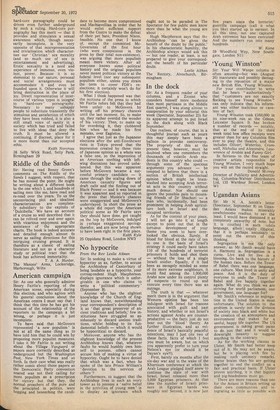American campaign
Sir: As one who generally admires Henry Fairlie's reporting of the American scene, especially during this election, and who agrees with his general conclusion about the American centre I must say that I think that this time he has got his account of the relationship of the reporters to the campaign a bit wrong, or perhaps it is just incomplete.
To have said that McGovern represented 'a new populism' is not at all the same thing as to have told him that he could win by proposing more populist measures. I take it Mr Fairlie is not writing about the Village Vanguard or Papers more correctly described as underground but the Washington Post, New York Times and so forth. In their case what was really rather comic about those papers as the Democratic Party convention neared was not their calling for more populism as a prescription for victory but that they, the normal preachers of the pure and the principled in politics, were begging and beseeching the candi
date to become more compromised and Machiavellian in order that he would enlist sufficient support from the Centre to make the defeat of their pet hate, President Nixon, feasible. No one that I know of, except the committed McGovernites of the first hour (who were conspicuous in the press by their total non-existence), was arguing that more populism meant more victory. After all everyone knows some political history and the original populism never meant political victory at the federal level (nor any subsequent populism either, unless you strain the term to cover FDR's reelections; it certainly won't do for his first election).
What I think happened was that the sections of the press to which Mr Fairlie refers felt that they had been unfair to McGovern by writing off his primary chances until the last moment. So, to make up, they rather overdid the wonder of his victory. Then, to make up for overdoing it, they clobbered him when he made his first mistake, over Eagleton.
I agree that just as the Japanese elections after the anti Eisenhcwer riots in Tokyo proved that the impression created by these riots of Japanese•opinion as a whole was a false one, so the impression of an American seething with leftwing discontent has proved unbalanced. But this was apparent before McGovern became a successful primary candidate — it came through the scaling down of American casualty figures and draft calls and the fizzling out of Black Power-and it was because it was apparent and so reported in the press that Muskie's chances were exaggerated and McGovern's underplayed. In short the press as a whole did report the American political scene as Mr Fairlie says they should have done, got catIght on the hop by McGovern, indulged in perhaps exaggerated apology therefor, and are now being shown to have been right in the first place.
Keith Kyle 25 Oppidans Road, London NW3










































 Previous page
Previous page